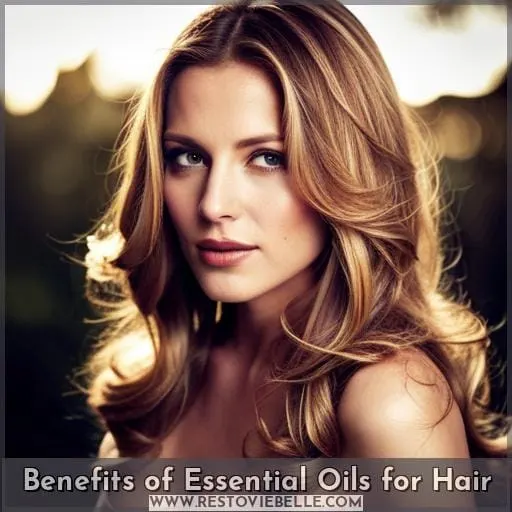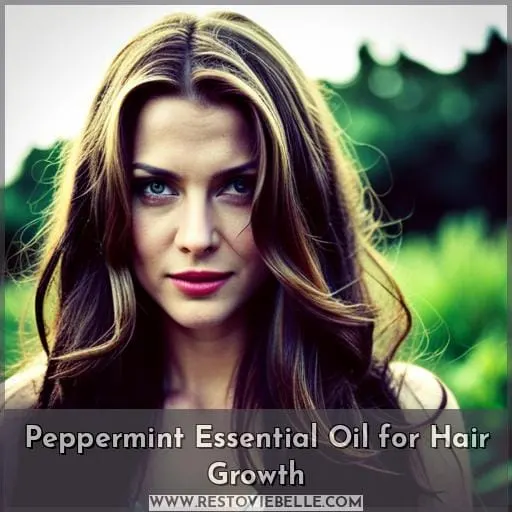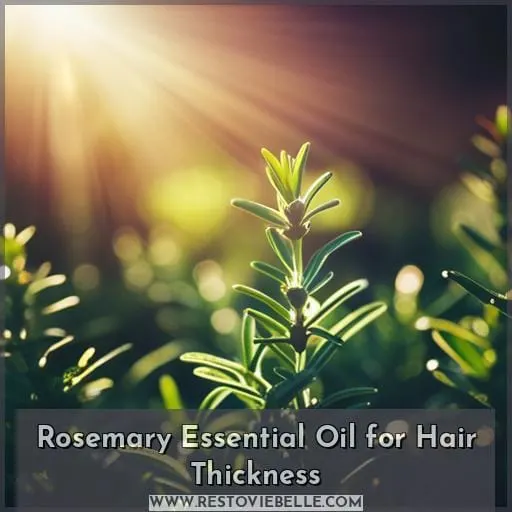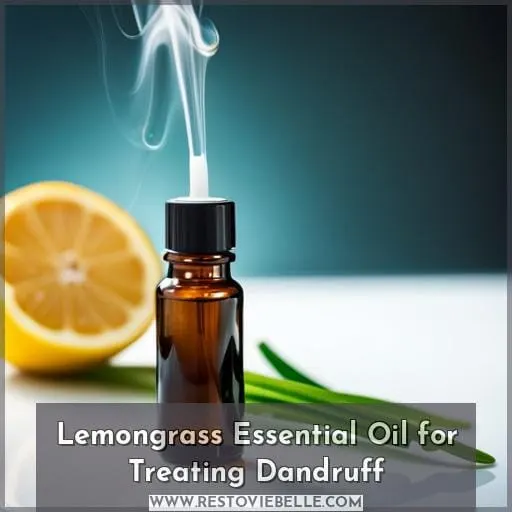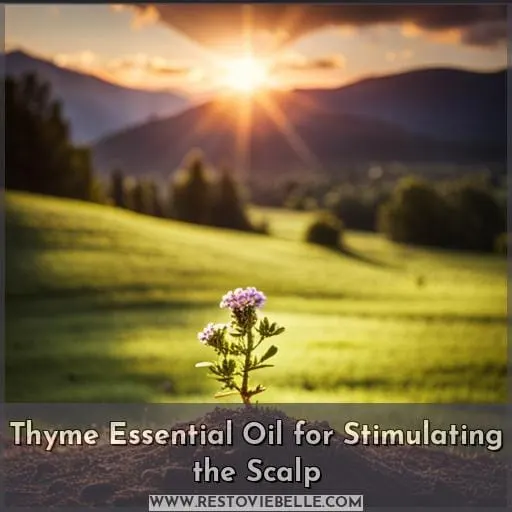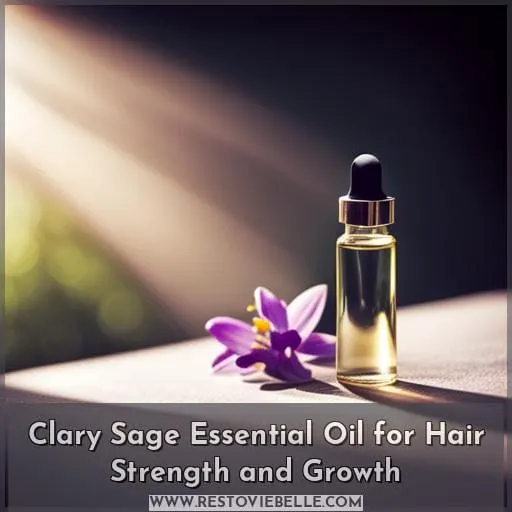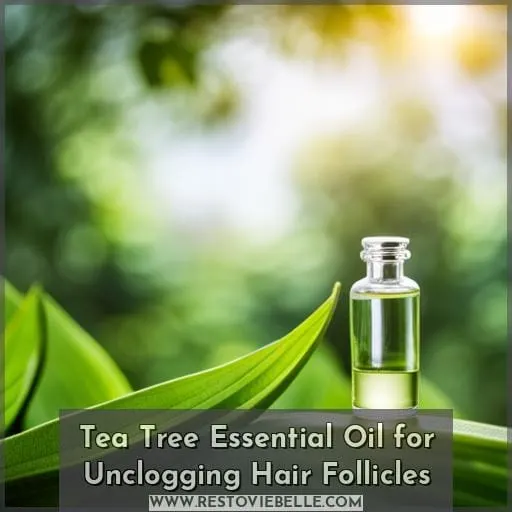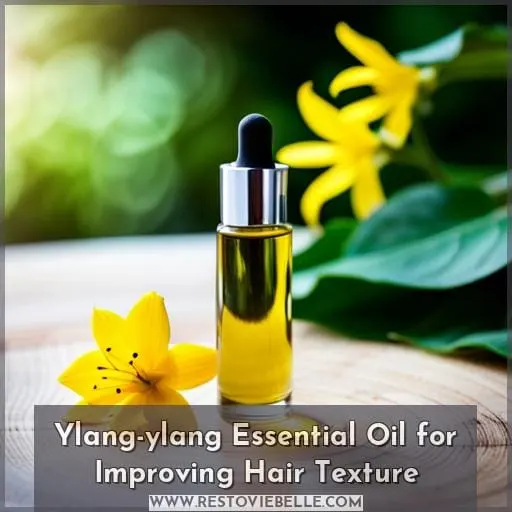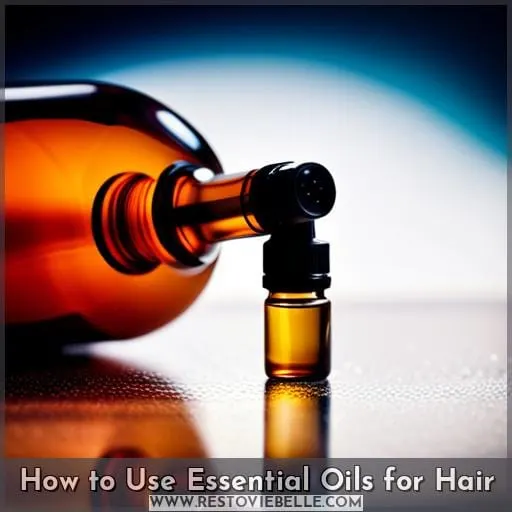This site is supported by our readers. We may earn a commission, at no cost to you, if you purchase through links.
 Are you wondering if essential oils are good for hair? With over 220 pounds of lavender flowers required to make a single pound of the oil, it’s no surprise that these concentrated extracts have been used in traditional and homeopathic medicine around the world.
Are you wondering if essential oils are good for hair? With over 220 pounds of lavender flowers required to make a single pound of the oil, it’s no surprise that these concentrated extracts have been used in traditional and homeopathic medicine around the world.
Essential oils can provide numerous benefits for your scalp and hair health, from encouraging new growth to treating dandruff. Let’s explore how essential oils like peppermint, rosemary, cedarwood, and lemongrass impact your locks and learn tips on using them safely.
Table Of Contents
- Key Takeaways
- Benefits of Essential Oils for Hair
- Peppermint Essential Oil for Hair Growth
- Rosemary Essential Oil for Hair Thickness
- Cedarwood Essential Oil for Reducing Hair Loss
- Lemongrass Essential Oil for Treating Dandruff
- Thyme Essential Oil for Stimulating the Scalp
- Clary Sage Essential Oil for Hair Strength and Growth
- Tea Tree Essential Oil for Unclogging Hair Follicles
- Ylang-ylang Essential Oil for Improving Hair Texture
- How to Use Essential Oils for Hair
- Conclusion
Key Takeaways
- Essential oils like lavender, peppermint, rosemary, and cedarwood promote hair growth and stimulate circulation.
- They can balance scalp oil glands, reduce sebum production, and improve hair texture.
- Essential oils such as tea tree oil, lemongrass oil, and clary sage have antibacterial properties that can treat dandruff, soothe itchy scalps, and reduce inflammation.
- Proper dilution and patch testing are important to prevent skin irritation when using essential oils on the hair.
Benefits of Essential Oils for Hair
Are you seeking natural solutions to promote hair growth, reduce hair loss, and treat scalp conditions? Essential oils offer an affordable and effective way to improve your tresses. With a wide range of benefits, these concentrated plant extracts can help give you the luscious locks that you’ve been dreaming of.
Promotes hair growth
Using essential oils, like lavender, peppermint, rosemary, and cedarwood, can help promote hair growth while naturally balancing the oil glands in your scalp. Rosemary oil stimulates circulation to encourage thicker locks over time. Peppermint is a cooling agent that increases blood flow for faster follicle development.
Cedarwood helps reduce excess sebum production to prevent breakage and thinning of strands. Lastly, lavender has antimicrobial properties that aid in keeping the scalp healthy and prevents itchiness or irritation on sensitive skin types.
- Massaging essential oils into your scalp improves the absorption rate of nutrients, which strengthens roots for better length retention.
- Mixing with shampoo or carrier oil before application ensures an even spread across all areas.
- Applying diluted blends directly onto dry scalps works best as it allows direct contact with each strand.
Reduces hair loss
A few drops of cedarwood oil can help balance your scalp’s oil glands and reduce hair loss. Massaging the essential oil into your scalp also increases circulation, stimulating hair growth in any areas affected by baldness or alopecia areata.
Other herbal remedies such as rosemary and thyme oils may be beneficial for thinning hair too.
Aromatherapy benefits abound as well. Ylang-ylang enhances texture while lemongrass effectively treats dandruff-related issues that lead to breakage and shedding strands.
Try incorporating these essential oils into a weekly routine of deep conditioning treatments to enjoy maximum natural results from their unique properties!
Treats scalp conditions
You can soothe your scalp with essential oils, like a cool compress on a feverish forehead.
- Lavender oil contains antifungal properties that aid in treating dandruff and other conditions of the scalp.
- Rosemary oil stimulates circulation, aiding in cell regeneration for healthier hair.
- Thyme oil helps treat itchy scalps while promoting thicker growth.
- Tea tree is an antibacterial agent perfect for reducing inflammation caused by fungal infections or psoriasis.
- Clary sage increases strength while balancing the pH level of the skin beneath your locks!
Essential oils provide natural relief from uncomfortable symptoms associated with common scalp ailments.
Peppermint Essential Oil for Hair Growth
Are you searching for a natural way to stimulate hair follicles and enhance blood circulation? Peppermint essential oil might be the solution! With its invigorating and cooling properties, this potent oil can effectively promote healthier scalp conditions while stimulating hair growth.
Stimulates Hair Follicles
Unlock your hair’s potential with the help of peppermint essential oil – a natural way to stimulate follicles and promote healthy growth. Stimulate your scalp with an aromatherapy massage, combining the invigorating aroma of peppermint oil for maximum benefits.
A few drops can be added to shampoo or conditioner, mixed in a carrier oil such as jojoba or coconut, or applied directly onto the skin for quick absorption into hair follicles. For best results, use regularly and combine other beneficial oils like lavender and cedarwood.
Increases Blood Circulation
Massaging your scalp with peppermint oil helps to increase circulation and promote healthy hair growth. Peppermint essential oil is a great option for those looking to add natural ingredients to their hair care routines.
It increases blood flow, allowing the follicles to receive more nourishment and oxygen, which can help reduce breakage or damage over time. Additionally, its cooling properties are known to soothe an irritated scalp while stimulating new cell growth for stronger strands of hair.
Rosemary Essential Oil for Hair Thickness
Are you seeking a natural way to improve the thickness of your hair and the health of your scalp? Rosemary essential oil may be the solution. This potent oil has a long history of use, with studies demonstrating its ability to stimulate hair growth and improve overall scalp health.
Promotes Hair Growth
Rubbing in rosemary oil can help you thicken your hair, like velvet on the scalp. Aromatherapy benefits make it an effective natural remedy for promoting hair growth and preventing breakage. Hair oiling with essential oils is a great way to improve texture and add shine without harsh chemicals or treatments.
Try incorporating rosemary into your regular care routine by massaging into the scalp before shampooing – this will also stimulate circulation! Essential oils should always be diluted though, as some skin irritation may occur if used undiluted or too frequently.
Lastly, look out for ylang-ylang oil, which increases manageability while reducing split ends – perfect for achieving that salon finish from home!
Improves Scalp Health
Applying Rosemary Essential Oil to your scalp can help improve its health for healthier, thicker hair. Try a scalp massage with the oil mixed with a carrier oil such as jojoba or coconut for maximum benefits.
Aromatherapy also comes into play here. Rosemary essential oil has many beneficial properties, including anti-inflammatory and antiseptic qualities, which aid in cultivating healthy scalps. You can also create DIY masks using essential oils for topical application onto the scalp or add them directly to organic haircare products like shampoos, conditioners, masks, etc.
It’s important not only to choose natural ingredients but also to be mindful of dosage when using any type of product containing essential oils. This is to avoid skin irritation, which often happens due to overuse or incorrect usage methods.
Cedarwood Essential Oil for Reducing Hair Loss
Cedarwood oil can help balance your scalp’s oil glands and reduce hair loss. It’s an essential oil with a wealth of benefits for promoting healthy, strong hair growth. Cedarwood essential oils contain antiseptic, anti-inflammatory, and astringent properties.
These properties can help regulate the production of natural sebum on the scalp and stimulate circulation to promote healthier follicles.
Improved blood flow encourages stronger strands from root to tip without increasing greasiness or clogging pores with excess sebum.
The aromatic nature of cedarwood provides calming aromatherapy benefits and soothes irritated scalps due to its antifungal and antibacterial qualities. This aids in combating dryness or dandruff that might be blocking healthy growth at the source.
Using cedarwood essential oils regularly may improve texture by preventing breakage and reducing itchiness caused by any temporary irritation.
The recommended usage for this particular type of treatment includes mixing several drops into shampoo or conditioner and applying directly onto affected areas before rinsing off after about 30 minutes, depending on what works best for you personally.
Overall, when used correctly, cedarwood’s therapeutic powers are known not only for their ability to aid in balancing out oily skin but also for providing relief from itchy scalps. This creates conditions ideal enough to foster thicker strands without having to worry about thinning out later down the line due to excessive shedding being triggered by unnecessary stressors found in everyday life, such as heat styling tools and harsh chemicals used in the products we use on a daily basis.
Lemongrass Essential Oil for Treating Dandruff
Are you dealing with an itchy, flaky scalp? Lemongrass essential oil may be the perfect solution. Its antifungal properties make it effective at soothing dry and irritated scalps while keeping dandruff in check.
Antifungal Properties
Discover the power of lemongrass essential oil to treat dandruff and keep your scalp free of fungus. Lemongrass essential oil has antifungal benefits that help soothe itchy skin irritation caused by dandruff.
It also nourishes the hair follicles for a healthier scalp. The natural oils in this versatile extract reduce product build-up on the hair shafts and promote regrowth with their anti-bacterial properties.
By combining lemongrass essential oil with tea tree or other similar essential oils, you can enjoy improved overall hair smoothness and shine. Say goodbye to flakes falling off onto your shoulders! This powerful blend provides maximum protection against fungal infections, which can lead to more serious issues if not addressed promptly.
Incorporate these beneficial ingredients into your regular haircare routine today for an effective way to fend off unwanted fungi and improve scalp health!
Soothes Dry, Itchy Scalp
Lemongrass oil can help soothe the dry, itchy scalp associated with dandruff. It has anti-inflammatory and antimicrobial properties that can work to reduce skin rashes due to allergies or irritation. This natural alternative is also great for providing relief from an itchy scalp while hydrating your skin at the same time.
Additionally, lemongrass oil helps prevent allergic skin reactions by calming down any inflammation present in the area of application. With its potent healing properties, this essential oil offers a safe and effective way to treat dandruff and other related issues without resorting to harsh chemicals or treatments.
Lemongrass oil provides many benefits for hair health including hydration of the scalp as well as soothing itchiness caused by dandruff – making it a great choice when looking for natural remedies against dryness on your head!
Thyme Essential Oil for Stimulating the Scalp
Thyme essential oil is one of the most popular herbal treatments for hair and scalp health. Its stimulating properties help strengthen and promote healthy growth, making it an excellent choice for those looking to improve their hair’s condition.
Thyme oil contains powerful antioxidants that can fight against environmental damage while also helping reduce inflammation in the scalp. The antiseptic qualities make it a great way to keep your hair clean by removing dirt, oils, and other debris that can lead to dandruff or infections on the scalp.
It has been used traditionally as aromatherapy for centuries because its strong scent helps relax tense muscles, which may be contributing factors to poor circulation in our scalps, leading to slower regrowth of new hairs!
This natural remedy is easy to use; just add a few drops into shampoo or massage directly onto wet strands before showering.
Clary Sage Essential Oil for Hair Strength and Growth
Are you looking for a natural way to improve your hair texture and reduce breakage? Clary sage essential oil may be the solution. This potent extract from the clary sage plant has been used since ancient times as an herbal remedy, and today it’s known for its many benefits on hair health, such as improving texture, reducing breakage, stimulating growth, and strengthening strands.
Improves Hair Texture
Ylang-ylang oil can help you enjoy improved hair texture and reduce breakage. It’s known to provide scalp nourishment, aromatic benefits, and hair hydration. Natural remedies like this essential oil promote healthy hair growth and vitality while leaving your locks with a lustrous shine.
Camellia tea oil stimulates the follicles for strong regrowth of healthy strands. Grapefruit peel oil helps remove product buildup for maximum volume. Orange peel oil soothes dry scalps while restoring vital nutrients that bring out natural luster in the tresses.
Use these oils to improve the overall health of the scalp and obtain a luxurious mane!
Reduces Breakage
You’ll love how ylang-ylang oil reduces breakage, like in the case of Jennifer, who noticed fewer split ends after using it regularly. It’s effective in preventing breakage because it strengthens strands and minimizes hair fragility.
Regular use helps reduce oxidative stress on hair follicles, which can lead to excessive damage.
Ylang-ylang is a powerful essential oil for reducing breakage and promoting healthy growth.
Tea Tree Essential Oil for Unclogging Hair Follicles
Are you looking to unclog your hair follicles and promote hair growth? Tea tree essential oil is a great option. It prevents scalp infections, enhances healthy hair growth, and has antifungal and antibacterial properties for optimal results.
Prevents Scalp Infections
Eliminate scalp infections and keep your hair healthy with tea tree oil! Packed with antifungal properties, this natural remedy helps prevent itching, flaking, and inflammation.
Mix a few drops of tea tree oil with lavender essential oil to help fight dandruff. Rosemary essential oil also fights fungal infections while lemongrass essential oil prevents bacterial growth on the skin’s surface.
Clary sage essential oil soothes irritated scalps as ylang-ylang essential oil cleanses away dirt from the pores of your head without stripping moisture from strands or irritating the skin further.
Maintaining healthy hair habits is key—try using tea tree oil today!
Enhances Hair Growth
Transform your tresses with the power of essential oils and watch as you gain strong, luscious locks! Tea Tree oil is a great option for unclogging follicles and encouraging hair growth. Blended with other natural ingredients such as lavender or horsetail plant extract oil, it can help promote scalp stimulation which stimulates thicker hair growth.
Essential oils are a better alternative to chemical treatments used in cases of self-perceived thinning hair because they provide nourishment without any harsh after-effects like irritation or dryness.
Create unique essential oil combinations that suit your needs. Pair tea tree with rosemary to treat dandruff while also enhancing the thickness and volume of existing strands.
Start utilizing these natural remedies today for fantastic results tomorrow!
Ylang-ylang Essential Oil for Improving Hair Texture
Are you looking to improve the texture of your hair? Ylang-ylang essential oil is a great tool to have in your arsenal. This powerhouse oil helps reduce breakage and split ends while adding shine and luster, leaving you with beautiful locks.
Reduces Breakage and Split Ends
Now ylang-ylang oil can help you avoid split ends and breakage for smoother, healthier locks. It’s an essential oil known to enhance hair texture and reduce damage caused by styling tools or harsh chemical treatments.
Rich in antioxidants, it helps nourish the scalp while protecting against environmental pollutants. Applying this natural treatment will improve hair smoothness and shine, as well as increase volume for a more voluminous look without sacrificing length or strength due to breakage from overuse of products or excessive brushing techniques.
Try incorporating ylang-ylang into your daily routine with other essential oils such as rosemary, peppermint, or jojoba for maximum benefits—your beautiful tresses will thank you!
Adds Shine to Hair
Ylang-ylang oil will dazzle your hair with its incredible shine! This natural remedy is an excellent alternative to harsh chemicals and provides a glossy, lustrous finish for your locks. A few drops of ylang-ylang oil mixed in carrier oils such as jojoba or coconut can be massaged into the scalp.
It’s also beneficial when added to shampoos and other hair-wash essentials, helping you achieve that shiny look without any extra products.
For best results, use this haircare tip regularly. It adds shine while keeping hair soft and looking healthy! Ylang-ylang essential oils are perfect for those seeking luxurious locks naturally, so why wait? Get glowing today!
How to Use Essential Oils for Hair
Are essential oils good for hair? Absolutely! Essential oils are an affordable and effective way to improve hair health. Dilute the oil with a carrier oil before use, then apply it directly to your scalp in various ways.
Dilution and Mixing With Carrier Oils
When using essential oils for hair, make sure to dilute and mix them with carrier oils for maximum benefits. You can choose from carrier oil options such as coconut, jojoba, or sweet almond. It’s important to follow the dilution guidelines to avoid skin irritation or allergies caused by overusing essential oils.
Generally, mix 1-3 drops of oil into a teaspoon of carrier oil before applying it to the scalp area. The mixing ratios may vary depending on individual needs, so it’s best to start with a smaller ratio and adjust as necessary during the scalp application process.
Always remember to test for potential allergic reactions through a skin patch test before applying the oils to your scalp as a safety precaution.
Application Techniques
To make the most of essential oils’ hair-enhancing benefits, it’s important to use them correctly. For instance, one study found that using a combination of lavender oil and cedarwood oil led to significant improvements in scalp health after just four weeks.
A scalp massage with high-performance essential oils is an effective way to boost circulation and nourish the roots for increased growth. Simply mix several drops into a carrier oil like jojoba or coconut before applying.
An overnight treatment is another beneficial technique. Blend your chosen oils with honey and yogurt, then apply liberally from root to tip before bedtime.
Hair masks can also be used as part of aromatherapy blends. Add coffee Arabica oil for extra shine!
If you’re allergic, reactions are possible, so always perform a patch test prior to full application on skin or hair strands.
With these techniques at your disposal, you’ll soon see results – healthy locks that glow naturally!
Proper Usage and Safety Tips
Before using essential oils on your hair, it’s important to understand proper usage and safety tips. Patch testing, dilution guidelines, allergic reactions, and child safety must all be taken into consideration for a safe application.
Overnight application is also an option for deeper nourishment at an affordable price while helping reduce any dermatological condition or product build-up. Research the best oil combinations such as cedarwood, clary sage, and lavender or jojoba with clary sage and cedarwood so that you can reap the full benefits of these natural remedies without risking harm from overexposure to high concentrations of essential oils.
Conclusion
Oh, the power of essential oils! They are a natural and affordable way to improve your hair health. These ancient remedies can promote hair growth and thickness, as well as treat scalp conditions.
Peppermint oil stimulates the hair follicles and increases circulation. Rosemary oil, on the other hand, boosts hair growth and improves scalp health. Cedarwood oil is known for balancing oil glands and reducing hair loss. Lemongrass oil is effective in treating dandruff, while thyme oil stimulates the scalp.
Clary sage, tea tree, and ylang-ylang oils offer additional benefits for hair texture and strength. It is important to dilute essential oils and perform a patch test to avoid skin irritation or allergies.
With proper usage and safety tips, essential oils can be an excellent way to naturally improve the health of your hair.

